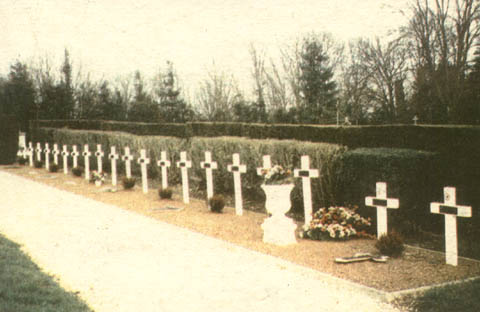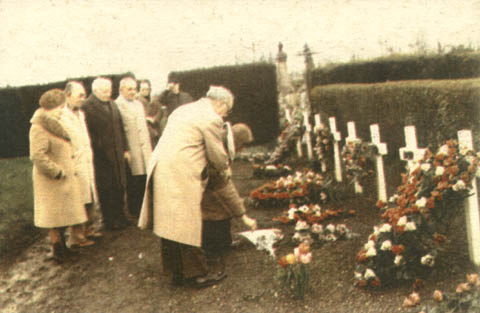P.S. This article is about WW1. And there are photos of the graves of the Romanian POWs.
| Printable Version of Topic
Click here to view this topic in its original format |
| WorldWar2.ro Forum > WW1 and Regional Wars (1912-1919) > German treatment of Romanian POWs |
| Posted by: dragos April 09, 2004 09:24 pm |
| An article in Revista de istorie militara 2(36)/1996, "Romanian military graves in French Ardennes" by Alexandru Mihail, presents a very bad treatment of Romanian POWs handled by the Germans, not even better than Soviet in WW2! According to this article, the Romanian POWs in Alsace and Lorraine camps were forced to slave labour, ragged, starved, beaten. Some old inhabitants rembers seeing Romanian POWs eating wood chips and bark. I'm curious, was this a selective treatment, or was applied indiscriminately by the Germans to POWs ? |
| Posted by: Florin April 09, 2004 09:43 pm |
| The prisoners from the West (the United States and Great Britain, including the dominions) enjoyed constantly a better treatment, all over war period. |
| Posted by: Dénes April 09, 2004 11:55 pm |
| One has to pay attention also to who wrote the article.
A historian who graduated from the Stefan Gheorghiu "University" (for the non-initiated: it was the Rumanian Communist Party élite's breeding ground) will hardly shed his/her years-long indoctrination, namely the Fascists (i.e. not only NSDAP party members, but also all soldiers of the German Army and Air Force) were the bad guys and all they did were terrible things. Not to mention the so-called "Horthysts" (i.e., the Hungarian military and civil administration as a whole). I suggest everyone to use his/her own mind to filter out such preconceived, thus biased ideas and dig out the actual facts from the rubbish. |
| Posted by: dragos April 10, 2004 12:05 am |
| I had no idea who was/is Alexandru Mihail. Denes, should we work out a "list" of authors ? P.S. This article is about WW1. And there are photos of the graves of the Romanian POWs. |
| Posted by: petru April 10, 2004 12:54 am |
| The harsh conditions for the eastern POW were not a myth. I read a memorial book of an officer who was POW. I don’t remember much details about the book because it was long time ago. Next to the officer camp it was an other camp for Russian soldiers. They were really starving and were eating any kind of animals they could catch. |
| Posted by: petru April 10, 2004 12:55 am |
| However, I think the most horrible treatment of the Romanian POW’s was applied in Bulgaria. |
| Posted by: Florin April 10, 2004 02:07 am | ||||
This logic works up to a point. If we stretch your idea to the extreme, we cannot trust anything written by anybody who occupied any kind of official (civil or military) position in a Communist, Fascist or Nazi regime. Unless, of course, the person wrote what you like to read... This means, at extreme, that we should not believe anything from "The lost victories" by Von Manstein, or Hruschev's memories on audiotapes, or the interviews with Albert Speer after he was released from prison, and so on. This kind of argument sounds to me as usingin mirror the tactics of Communists everywhere, after they took power. They claimed: "Nothing you are doing cannot be good, because you had a rank in the Capitalist regime."
Yes, it is really sad what happened in the POW camps in Germany, and moreover, in the concentration and extermination camps. However, we should not forget the whole picture: the average German himself (or herself) was living with scarce ration, at the edge of starvation, in the Winter of 1944 and Spring of 1945. The situation turned into worse after capitulation: it is estimated that the average German had 600 calories per day, in the Allied occupied Germany. PS: Sorry... You talk about WWI. Well, it was not much difference, regarding the ratio available to the average citizen of Germany, or of Austria-Hungary. 763000 Germans died of starvation as a direct result of the British Royal Navy's blockade. (source: Associated Medical Services of Germany.) That was during the war. On 13 December 1918, a month after the cease-fire, the Germans asked for essential goods to be allowed through the blockade. These included wheat, fats, condensed milk, and medical supplies. Permission was refused. In Bohemia in February 1919, 20 per cent of the babies were born dead and another 40 percent died within one month. In March 1919, the general commanding the British Army of the Rhine reported to London that his soldiers found the sight of starving children unendurable. |
| Posted by: Dénes April 10, 2004 03:28 am |
| Let me repeat what I wrote: "I suggest everyone to use his/her own mind to filter out preconceived, thus biased ideas and dig out the actual facts from the rubbish."
I wrote this, because I've seen old, pre-1989 ideas recycled in the new, post-1989 era, with little or no change. It's interesting to see, for example, in recent writings of some already known historians, how they write about 'Germans' up to August 23, 1944 and suddenly, in the same text, about 'fascists' and 'hitlerites' when describing events after that date. Old habits die hard. I certainly would not trust 100% a recent article written by someone who 'danced' earlier to the Communists' tunes. This was not directed towards the author Dragos mentions, as I wasn't aware of his name when I wrote my post. It doesn't matter, either, as my post was a general caveat. This is, of course, only my opinion. Everyone is entitled to his/her approach. However, it's always recommended to use the aforementioned "mind filter" when dealing with history, or, for a fact, every day news. P.S. There is really no need to generalize, as it'd be only an attemp to divert attention from what I've actually wrote. Generalization is never a solid argument. |
| Posted by: Dénes April 10, 2004 03:37 am | ||||
Florin, if you replace the word "anything" with "everything" then yes, I agree 100%. |
| Posted by: Florin April 10, 2004 05:19 am |
| OK, OK... On my behalf, I am trying hard to "filter" the information.
That's why when I study the news, I try a synthesis between PBS TV station, BBC, France Presse, ABC, CNN and Al-Jazeera. |
| Posted by: petru April 10, 2004 05:27 am | ||
Where did you learn Arabic? |
| Posted by: Dénes April 10, 2004 03:39 pm | ||
That's what I exactly do, too. Include to the list several German, Rumanian and Hungarian sources. Petru, Al-Jazeera has a completely English site. I, too, check it out sometimes. |
| Posted by: dragos03 April 11, 2004 10:00 pm |
| About the treatment of Romanian POW's in Bulgaria, there are 2 very interesting books written by the poet George Toparceanu: "Amintiri din luptele de la Turtucaia" (Memories from the battle of Turtucaia) and "Pirin-Planina". |
| Posted by: Carol I April 15, 2004 09:55 am | ||
Was it about the http://www.agero-stuttgart.de/REVISTA-AGERO/ISTORIE/misterul.htm? 
Image source: http://www.informatik.uni-stuttgart.de/fmi/szs/people/stefanescu/summer_2003.html |
| Posted by: dragos April 15, 2004 07:55 pm | ||
The article speaks of cemeteries at Rethel and Signy l'Abbaye. 
 |
| Posted by: Carol I April 15, 2004 10:32 pm | ||
Thanks Dragos for the reply. I did not know that there were several WWI Romanian Military Cemeteries in France. |